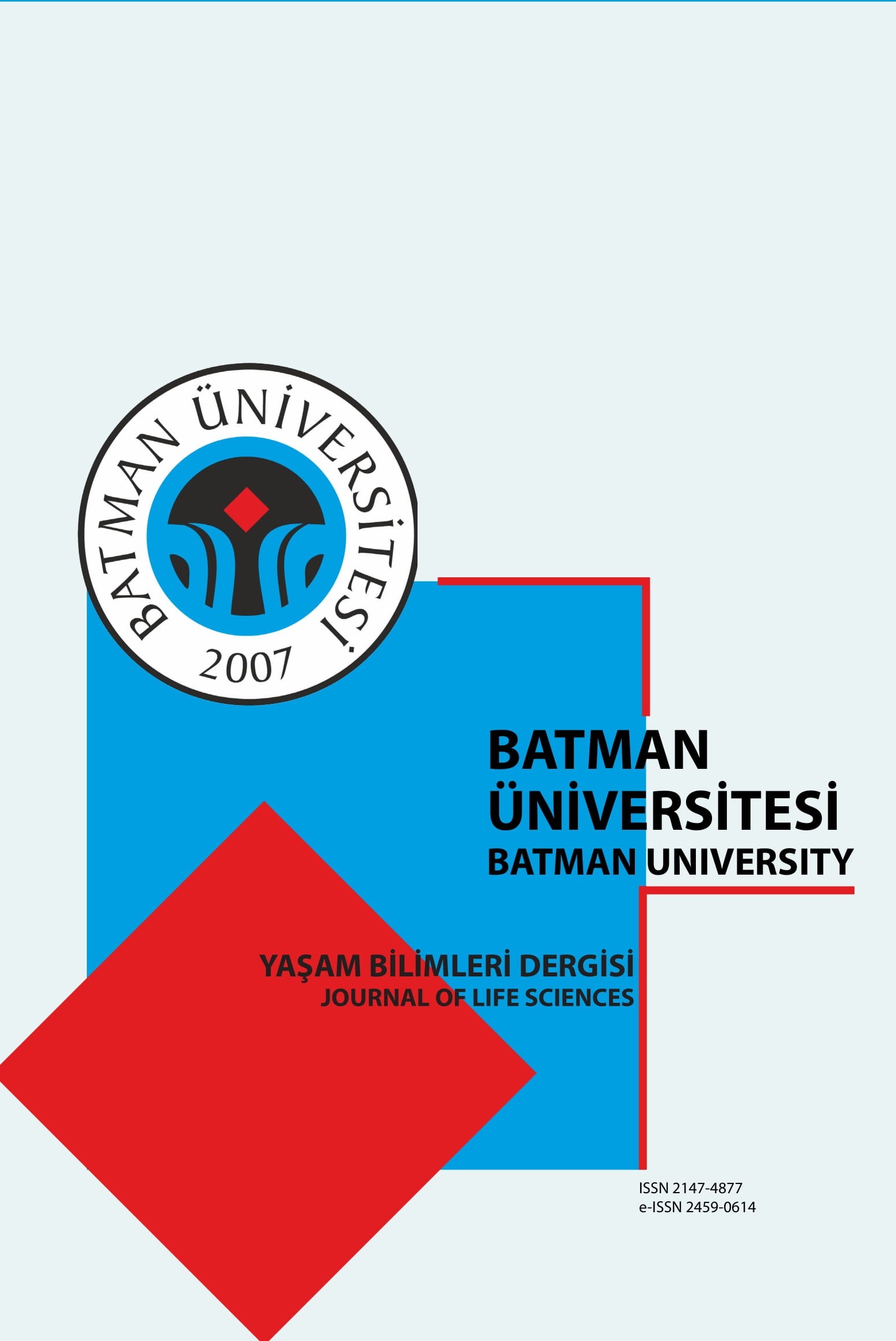Bambu Lifinin Balık Köfte Üretiminde Kullanım Olanakları
Bambu lifi, diyet lifler, balık köfte, köfte kalitesi
Usage Possibilities of Bamboo Fibre in Production of Fish Meatball
Bamboo fibre, dietary fibres, fish meatball, meatball quality,
___
- Anonim (2002). Offical Methods of Analysis (17th ed.). Association of Official Analytical Chemists, Washington, DC.
- Bilek, A.E., ve Turhan, S. (2009). Enhancement of the Nutritional Status of Beef Patties by Adding Flaxeed Flour, Meat Sciences, 82(4), 472-477.
- Cava, R., Ladero-Cantero, L., ve Ramirez, V.R. (2012). Assessment of Different Dietary Fibers (tomato fiber, beet root fiber, and inulin) for the Manufacture of Chopped Cooked Chicken Products, Journal of Food Sciences, 77(4), 346-352.
- Congtham, N., Bisht, M.S., ve Haorongbam, S. (2011). Nutritional properties of bamboo shoots: Potential and prospects for utilization as a health food, Comprehensive reviews in food sciences and food safety, 10(3), 153-169.
- Dhingra, D., Michael, M., Rajput, H., ve Patil, R.T. (2012). Dietary fibre in foods: a review, Journal of food sciences and technology. 49(3), 255-266.
- Gökalp, H.Y., Kaya, M., Tülek, Y., & Zorba, Ö. (1999). Et ve Ürünlerinde Kalite Kontrolü ve Laboratuvar Uygulama Klavuzu. Erzurum: Atatürk Üniversitesi Ziraat Fakültesi, Yay No: 318.
- Golge, O., Kilincceker, O., ve Koluman, A. (2018). Effects of different fibers on the quality of chicken meatballs, Journal of Food Safety and Food Quality, 69(6), 177-183.
- Hui, Y.H. (2007). Factors Affecting Food Quality: A Primer. In L.M.L. Nollet (Ed.), Handbook of Meat, Poultry and Seafood Quality (pp 3-6). Iowa: Blackwell Publishing.
- Kılınççeker, O. (2017). Diyet özellikteki bazı bitkisel liflerin tavuk köftelerde kullanım olanakları, ADYUTAYAM, 5(1), 1-9.
- Kılınççeker, O., ve Karahan, A.M. (2019). Keçiboynuzu (Ceratonia siliqua L.) ununun tavuk köfte üretiminde kullanım olanakları, Iğdır Üniversitesi Fen Bilimleri Enstitüsü Dergisi, 9(2), 862-869.
- Kilincceker, O., ve Yilmaz, M.T. (2019). Physicochemical, technological and sensory properties of chicken meatballs processed with dietary fibers, Journal of Hellenic Veterinary Medical Society, 70(2), 1525-1532.
- Kocatepe, D., ve Turan, H. (2018). Su Ürünleri İşleme Teknolojisinde Kullanımı Yasal Olan Gıda Katkı Maddelerinin Değerlendirilmesi, Uluslararası Doğu Akdeniz Tarımsal Araştırma Enstitüsü Dergisi, 1(1), 78-95.
- Kurt, Ş., ve Kılınççeker, O. (2012). The Effects of Cereal and Legume Flours on the Quality Characteristics of Beef Patties, Kafkas Üniversitesi Veteriner Fakültesi Dergisi, 18(5), 725-730.
- Mansour, E.H., ve Khalil, A.H. (1997). Characteristics of low-fat beef burger as influenced by various types of wheat fibers, Food Research International, 30(3–4), 199-205.
- Nesheim, M. C. ve Yaktine, A. L. (2007). Seafood Choices: Balancing Benefits and Risks. Washington, D.C.: The National Academic Press.
- Petracci, M., Bianchi, M., Mudalal, M.S., ve Cavani, C. (2013). Functional ingredients for poultry meat products, Trends in Food Science and Technology, 33(1), 27–39.
- Pinero, M.P., Parra K., Huerta-Leidenz, N., Moreno, L.A., Ferrer, M., Araujo, S., ve Barboza, Y. (2008). Effect of oat’s soluble (β-glucan) as a fat replacer on physical, chemical, microbiological and sensory properties of low-fat beef patties, Meat Science, 80(3), 675–680.
- Sanchez-Zapata, E., Munoz, C.M., Fuentes, E., Fernandez-Lopez, J., Sendra, A., Sayas, E.E., ve Navarro, C. (2010). Effect of tiger nut fiber on quality characteristics of pork burger, Meat Science, 85(1), 70–76.
- Sanz, T., Salvador, A., ve Fiszman, S.M. (2004). Effect of concentration and temperature on properties of methylcellulose-added batters Application to battered, fried seafood, Food Hydrocolloids, 18(1), 127-131.
- Soltanizadeh, N., ve Ghiasi-Esfahani, H. (2015). Qualitative Improvement of Low Meat Beef Burger Using Aloe vera, Meat Science, 99(1), 75-80.
- Talukder, S., ve Sharma, D.P. (2010). Development of dietary fiber rich chicken meat patties using wheat and oat bran, Journal of Food Science and Technology, 47(2), 224–229.
- Yilmaz, I. (2004). Effects of rye bran addition on fatty acid composition and quality characteristics of low-fat meatballs, Meat Science, 67(2), 245–249.
- ISSN: 2147-4877
- Yayın Aralığı: Yılda 2 Sayı
- Başlangıç: 2012
- Yayıncı: Batman Üniversitesi
Fatma HEPSAĞ, Mustafa FERLİASLAN, Onur DURAN, Serra OKUR, Yahya YILDIZ
Bilişim Teknolojileri Öğretmen Adaylarının Sanal Sınıf ve Uygulamalarına Yönelik Görüşleri
Üniversite Öğrencilerinde Teknoloji ve İnternet Bağımlılığı Arasındaki İlişkinin İncelenmesi
Oğuz EMRE, Ayşegül ULUTAŞ, Fatma NİSAN, Ayşe Nur GÖRGEN, Hatice Birgül CUMURCU
DPPH Antioksidan Analizinin Yeniden Değerlendirilmesi
Ramazan İNCİ, Sinan ASLAN, Ercan ÇINAR, Sultan ÇEÇEN
Türkiye’den Endemik Hypericum Türleri Üzerinde Çalışmalar
Sembolik Bir Edebiyat Eserinin Müziğe Yansıması: Don Kişot
Promethee Sıralama Yöntemi İle Yatırım Projesi Değerlendirme ve Üretim Sektöründe Uygulanması
